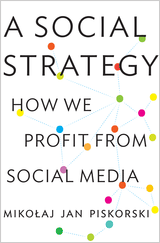Book Review: A Social Strategy: How We Profit from Social Media

Mikolaj Piskorski: A Social Strategy: How We Profit from Social Media. Princeton, NJ: Princeton University Press, 2014. 275 pp. $29.95, cloth.
You can read the book review by Olga Khessina of ILR School Cornell University published online by Administrative Science Quarterly. From the review:
Social strategy is still an emerging phenomenon, but it is increasingly important. There is a great need to understand the role of social strategy not only in building companies’ competitive advantage but also in developing industries. Scholars of industrial evolution, such as organizational ecologists (e.g., Hannan, Pólos, and Carroll, 2007) and researchers of product life cycles (e.g., Klepper, 1996) and dominant design (e.g., Benner and Tripsas, 2012), may find this book appealing, because social strategy may play an important role in the evolution of both new and traditional industries. For example, recent research in organizational ecology suggests that producers may facilitate identity building and legitimation processes in new industries by engaging their audiences to convert the intrinsic appeal of producers’ offerings into actual appeal (Hannan, 2010). Specific forms of engagement, however, have remained underexplored (Verhaal, Khessina, and Dobrev, 2015). Piskorski suggests that one way companies could successfully engage their audiences is by means of social strategy: producers may engage audiences socially and in this way increase the actual appeal of their offerings. Empirical research could investigate whether such social engagement is effective for identity building and
legitimation processes at both organizational and industry levels, whether new or existing companies are more likely to benefit from social engagement, what role social engagement plays in long-term industrial dynamics, and other interesting questions.
You can read the rest of the review from Administrative Science Quarterly for free by clicking here. Want to know about all the latest research and reviews like this from Administrative Science Quarterly? Click here to sign up for e-alerts!






























































































